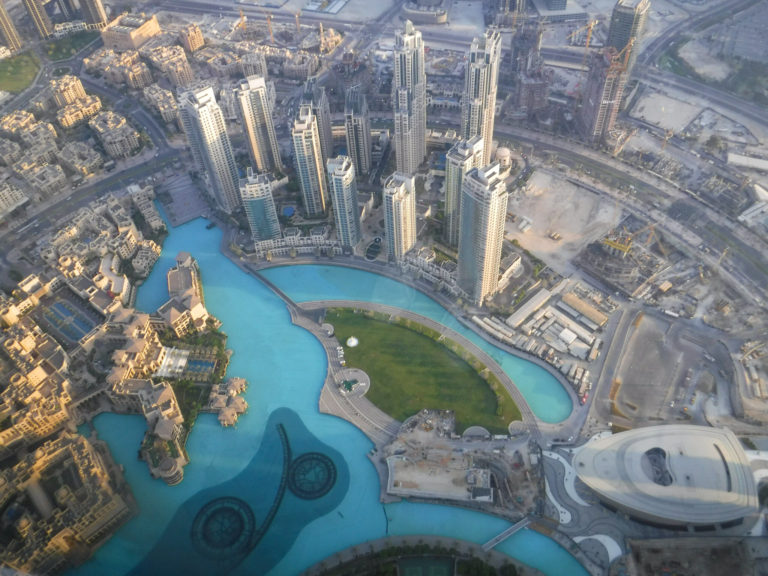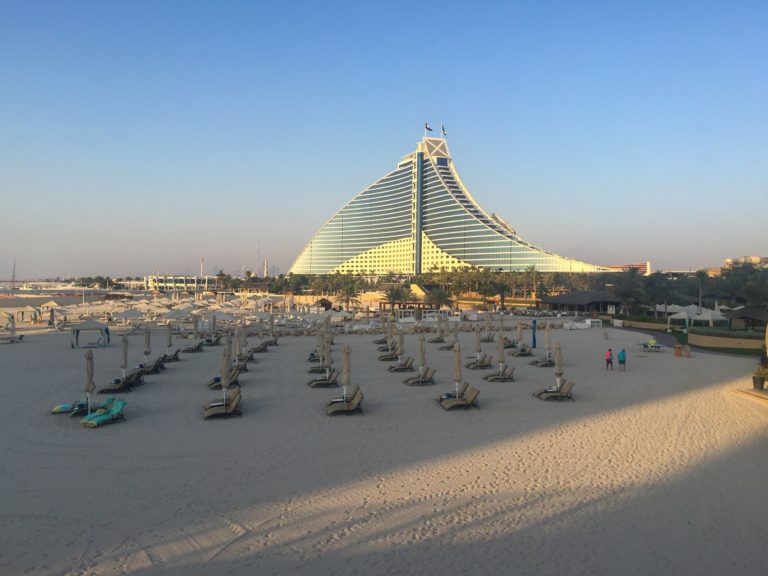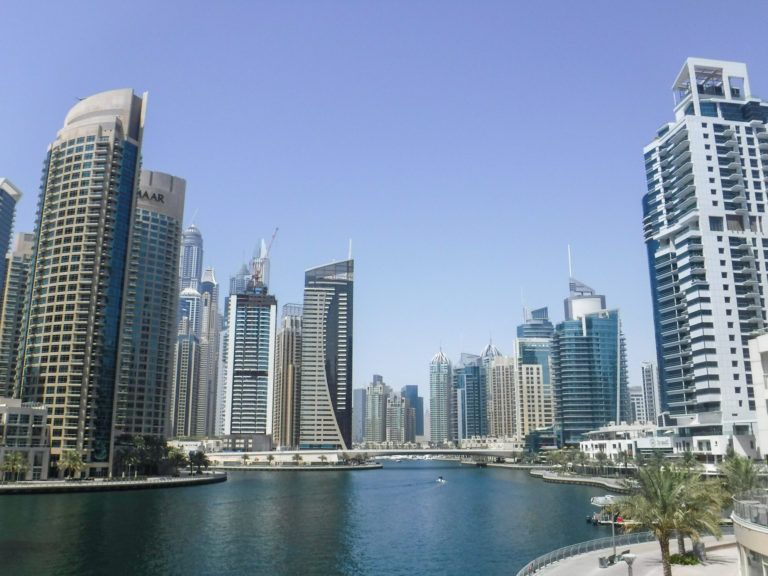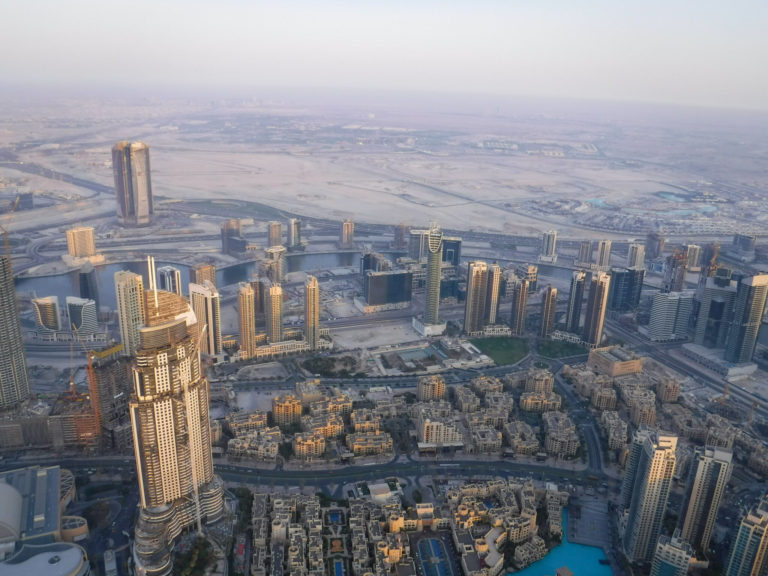The Thorough Guide to Dubai: Public Transport + What You Need to Know Before You Go
A complete list of everything you need to know before you go to Dubai, including laws and customs, and a public transport map.
(Updated 2024)
This post may contain affiliate links, which means we might earn a small commission on anything purchased through these links at no extra cost to you. Learn more on our Disclaimer page.

Time needed: 4-10 days.
When to go: September-April for sunny weather but to avoid the scorching temperatures.
Weather: Averages of 14°C-23°C in the Winter and 38°C-42°C in the Summer.
Language: Arabic.
Currency: United Arab Emirates Dirham.

Getting to Dubai
First thing’s first, how do you get to Dubai?
Plane
Most flights will land at Dubai International Airport (DXB), which is actually the world’s busiest airport by international passenger traffic, but some will land into the newer Al Maktoum International Airport (DWC, Dubai World Central). Try to get a window seat to take in the sheer vastness of the city and see where the skyscrapers meet the desert.
Airport Connections
The fastest way to get into the city is by taxi. If you arrive at Dubai International Airport or Al Maktoum International Airport there is a fixed starting rate. For a regular taxi you pay AED 20 and for all other taxi services, such as a Female taxi or for disabled persons, the starting rate is AED 25. You pay AED 1.96/km.
You can easily take the metro, Dubai’s rapid transit rail network, from the airport into the city. Check out the section below for everything you need to know about riding the metro.
From Abu Dhabi
The 91 mile journey from Abu Dhabi to Dubai takes around 2h 45 minutes. You can hire a car, take a taxi or take the bus. Operated by Dubai RTA, the Abu Dhabi to Dubai bus service departs from Abu Dhabi, Central Bus Station 1 and arrives into Global Village 1.

Public transport in Dubai
You must purchase a Nol Card to ride the tram or metro (and it can give you access to all sorts of other public transportation in Dubai). The card can be purchased instantly from any ticket office or a number of ticket vending machines. Typically, residents of Dubai have a blue, silver or gold Nol Card, while visitors opt for red or silver.
Gold Card
Price: AED 25, including balance AED 19
Maximum balance amount: Anonymous: 1000 AED; Registered: 5000 AED
Validity: 5 Years
Personal Card
Price: AED 70, Credit AED 20
Maximum balance amount: AED 5000
Validity: 5 years
Blue Card
Available for Students, Senior Citizens and residents and people of determination.
Price: AED 70, includes AED 20 e-purse value
Maximum balance amount: AED 5000
Silver Card (recommended)
Price: AED 25, including balance AED 19
Maximum balance amount: Anonymous: 1000 AED; Registered: 5000 AED
Validity: 5 years
Red Ticket
Price: AED 2
Maximum balance amount: Rechargeable use for maximum of 10 journeys or 5 daily passes
Validity: 90 days or 10 trips

Tram
Dubai’s tram network links Dubai Metro and the Palm Monorail and runs along Al Sufouh Road and Jumeirah Beach Road and offers 11 station stops. It takes approximately 40 minutes from end to end and trams run approximately every 6-8 minutes. There are cabins designated for only women and children commuters and Gold Class for private cabins – so check which doors you’re standing at before you get on.
Baggage policy: 2 suitcases permitted per passenger: 1 x Large Suitcase (dimensions should not exceed 81cm x 58cm x 30cm) and 1 x Small suitcase (dimensions should not exceed 55cm x 38cm x 20cm)
Hours: 06:30-01:00 daily, except Fridays – 09:00-01:00
Prices: Silver Nol Card: AED 3 per ride; Red Nol Card: AED 4; Children under 5: free
Stations:
- Jumeirah Beach Residence 1
- Jumeirah Beach Residence 2
- Jumeirah Lakes Towers: Links with the Dubai Metro
- Dubai Marina Mall
- Dubai Marina: Links with the Dubai Metro
- Marina Towers
- Mina Al Seyahi
- Media City
- Palm Jumeirah: Links with the Palm Monorail
- Knowledge Village
- Al Sufouh
To use the card on the tram, scan the card at the platform screen doors.
Metro
Dubai’s metro is a 74.6 km mass rapid transit system with 47 stations and 3 lines (Red, Green & 2020). The driverless trains have extensive window panels for incredible views of the city.
Green Line: Etisalat – Creek
Total Length: 22.5 km
Station stops: 20
Stations: Etisalat, Al Qusais, Dubai Airport Free Zone, Al Nahda Stadium, Al Qiyadah, Abu Hail, Abu Baker, Al Siddique, Union, Baniyas Square, Palm Deira, Al Ras, Al Ghubaiba, Al Fahidi, Burjuman, Oud Metha, Dubai Healthcare City, Al Jaddaf Creek
Hours: 05:30-00:00 Saturday-Wednesday, 05:30-01:00 Thursday, 10:00-01:00 Friday
Route 2020: Nakheel Harbour and Tower – Expo 2020
Total Length: 15 km (19 mi)
Stops/Stations: 7
Stations: Nakheel Harbour and Tower, Expo 2020, Green Community, Jumeirah Golf Estates, Al Furjan, Discover Gardens
Hours: 05:00-00:00 Saturday-Wednesday, 05:00-01:00 Thursday, 10:00-01:00 Friday
Baggage policy: 2 suitcases permitted per passenger: 1 x Large Suitcase (dimensions should not exceed 81cm x 58cm x 30cm) and 1 x Small suitcase (dimensions should not exceed 55cm x 38cm x 20cm)
Hours: 06:30-01:00 daily, except Fridays – 09:00-01:00
Red Line: Al Rashidiya – UAE Exchange (Jebal Ali)
Total Length: 52.1 km (32.4 mi)
Station stops: 29
Stations: Al Rashidiya, Emirates Dubai International Terminal 3, Dubai International Terminal 1, GGICO, Deira City Center, Al Rigga, Union, Burjuman, ADCB (Previously Al Karama), Al Jafaliya, World Trade Center, Emirates Towers, Financial Center, Burj Khalifa/Dubai Mall, Business Bay, Noor Bank FAB – First Abu Dhabi Bank Mall of the Emirates Sharaf DG, Dubai Internet City Nakheel, Dubai Marina DMCC (Previously JLT), Nakheel Harbour & Tower Ibn, Battuta Energy, Danube, Jebal Ali
Hours: 05:00-00:00 Saturday-Wednesday, 05:00-01:00 Thursday, 10:00-01:00 Friday
Prices: 1 Zone or <3km 2 zones / 2 Zones / 3+ Zones
- Standard Adult Ticket (Red): AED 4 / AED 6 / AED 8.50
- Pre-paid Standard Adult Ticket (Silver Nol): AED 3 / AED 5 / AED 7.50
- Concessionary (Blue Nol Card): AED 1.50 / AED 2.50 / AED 3.75
- Gold Class (Red Ticket): AED 8 / AED 12 / AED 17
- Gold Class Pre-Paid: AED 6 / AED 10 / AED 15

The Palm Monorail
The Palm Islands are three artificial islands: Palm Jumeirah, Deira Island and Palm Jebel Ali off the coast of Dubai. The Palm Jumeirah is the only completed island, housing a number of hotels, resorts and restaurants. Here you’ll find the first monorail in the Middle East, a 5.4-kilometre-long (3.4 mi) journey from the mainland to the tip of the Palm.
There are 5 stations: Palm Gateway, Al Ittihad Park, Nakheel Mall, Atlantis Aquaventure Waterpark, The Pointe.
Hours: 09:00-22:00, every 15 minutes daily
Prices: Single – Al Ittihad Park: AED 10, Nakheel Mall: AED 10, Atlantis Aquaventure: AED 20; Return – Al Ittihad Park: AED 15, Nakheel Mall: AED 15, Atlantis Aquaventure: AED 30

Bus
One of the best ways to get around AND see the sights is the hop on hop off bus. Choose between Big Bus Tours or City Sightseeing, both of which offer a variety of routes and tickets.
For public buses, check out PTA, which operates an extended bus network of 119 internal lines. With 35 lines linking to metro stations, 12 intercity lines to transport passengers to other emirates, 62 internal lines and 8 fast lines they’ll get you anywhere you need to go. The network covers 82% of the urban areas in Dubai, and transports about 369,248 passengers per day.
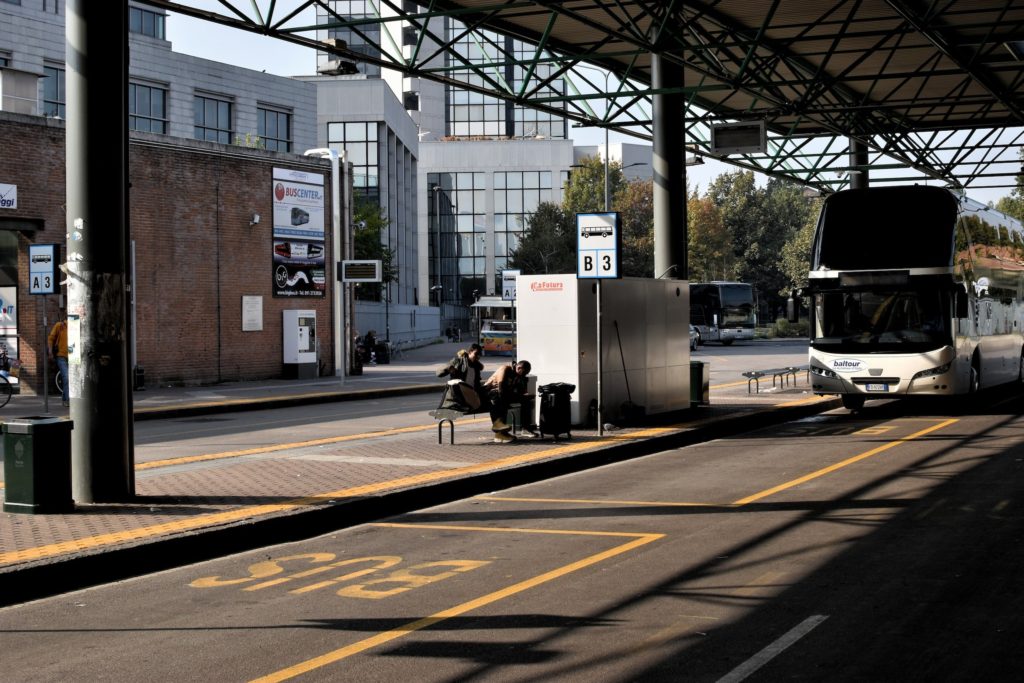
Taxi
You’ll find 2 types of taxi in Dubai – official taxis and private taxis:
Official taxis – all charge the same rate, are controlled by the government and can be recognized by the cream coloured body and a random coloured roof. The colour of the roof determines for which company the taxi drives, for example taxis with a red roof are the most common and also the largest company.
Private taxis – use a higher rate and mainly work for the Roads & Transport Authority (RTA).
Taxis with a pink roof are special taxis that can only be taken by women with or without children. The drivers of these taxis are also women. These can be used by women of all nationalities and are available 24/7.
If passing through Salik toll gates, the customer will pay the toll required (average price: AED 4). In case you are unwilling to pass through Salik toll gates, please inform the taxi driver of alternative routes.
Exceptions:
- There is a fixed starting rate of 12 AED on Thursdays & Fridays and during peak hours. (peak hours are from 07:00–10:00 & 16:00-20:00)
- The minimum total fare is 12 AED
- When the taxi has to wait you pay 0.5 AED per minute
- An extra charge of 20 AED applies when passing through Sharjah emirate
How to find or book a taxi:
- If you cannot immediately find an available taxi you can hail a taxi from the road.
- You can find taxis in taxi ranks, which can be found at major attractions, such as hotels, airports, shopping centres and stations.
- It is possible to call a taxi and have it delivered to a specific location. For this service you pay a little more, 4 AED ($ 1) to be exact. If you are staying in a hotel, you can also have a taxi called by reception, but always make sure you ask for an official taxi not a private one.
- It is also possible to book a taxi via the Careem app. Simply indicate where the taxi should come to get you. You can also view the estimated waiting time, travel time and costs for this ride in advance.
Prices:
Regular taxi (including van) booked
06:00-23:00: AED 8
23:00-06:00: AED 9
Price/km: AED 1.82
Regular taxi (including van) pickup
06:00-23:00: AED 5
23:00-06:00: AED 5.5
Price/km: AED 1.82

If in doubt, have a hotel reception call a taxi for you – most reception’s will be willing to assist you even if you’re not staying at their hotel.
Bike
Bicycles are available to rent across the city and are common in popular parts of Dubai, including Downtown Dubai and Dubai Marina. Nextbike, Byky and Trek Bikes are popular companies to rent from, while Careem BIKE is the first large-scale, bike-sharing initiative in the region.
Boat
Unsurprisingly, considering Dubai is a canal-based city on the seafront, there are plenty of boat options to get around. From the affordable AED 1 abra crossing to luxury yacht rentals, there’s something for every budget. The RTA also offers the Dubai Ferry – from AED 15, visitors can tour the Dubai coastline and stop off at a number of neighbourhoods, including Business Bay and Dubai Marina. Ferries depart from the Al Jaddaf station daily at 10:00, 12:00 & 17:30.
Abra Ride Across Dubai Creek
For just AED 1 you can hop on one of the many traditional boats, known as abras, to cross the creek that separates Bur Dubai from Deira, Dubai’s city centre. These water taxis run every few minutes throughout the day across four stations along Dubai Creek:
- From Deira Old Souk Abra Station (near the Spice Souk) to Bur Dubai Abra Station (west of the Old Souk)
- From Al Sabkha Abra Station (just southwest of Baniyas Square) to Dubai Old Souk Abra Station
Each abra holds about 20 passengers, with 150 abras working the two routes. You simply buy a one-way ticket and each journey only takes about five minutes.
You can even hire your own abra for an hour to explore further up the creek!

Yacht
If you want bit more luxury, why not push the boat out (whey!) and take a Dubai Marina tour? Take a slow-paced, panoramic evening tour of Dubai Marina and Palm Lagoon and witness an unforgettable sunset.
Hours: 18:00, 19:00 & 20:00
Prices: Adult: AED 175, Children (5-12): AED 120, Private charter: AED 1995
Or head out to sea on a private yacht with Xclusive Yachts, Dubai’s only 5 star Luxury Yacht Rental Company. There’s a wide variety of packages to choose from, all with different boats, times and prices.
Scooter
Motorised and e-scooters are becoming increasingly popular in neighbourhoods across Dubai and can be unlocked by downloading a licensed operator’s smartphone app – Careem, Tier, Skurtt, Arnab or Lime. Scooters can be found at locations including the Sheikh Mohammed bin Rashid Boulevard in Downtown Dubai, Jumeirah Lakes Towers, and Dubai Internet City.

What to know before you go
*Advice below is from the Gov.UK website, please check the relevant advice from your home country*
Laws and customs
The UAE is a Muslim country. You should respect local traditions, customs, laws and religions at all times. There may be serious penalties for doing something that might not be illegal elsewhere. Be aware of your actions to ensure that they don’t offend, especially during the holy month of Ramadan or if you intend to visit religious areas.
Swearing and making rude gestures (including online) are considered obscene acts and offenders can be jailed or deported. Take particular care when dealing with the police and other officials.
Public displays of affection are frowned upon, and there have been several arrests for kissing in public.
Pedestrians should take great care. Only cross roads using designated pedestrian crossings, failure to comply can lead to prosecution. Vehicles often don’t stop at zebra crossings marked on the roads.
Medicines and drugs
If you’re planning to travel with prescribed or over the counter medicines for personal use, you’ll need to meet the UAE’s specific requirements for your medicine to be allowed into the country. A list of medicines where this rule applies, allowed quantities and documents to present can be found on the UAE Ministry of Health website.
There is zero tolerance for drugs-related offences.
Some skincare products and E-cigarette refills may contain ingredients that are illegal in the UAE such as CBD oil.
Alcohol
It is not illegal for tourists to drink alcohol however alcohol can only be consumed privately or in licensed public places. It is illegal to drink or be under the influence of alcohol in public. In Dubai and all other emirates besides Sharjah, the drinking age is 21. Drinking alcohol in Sharjah is illegal. Passengers in transit through the UAE under the influence of alcohol may also be arrested.
Health and safety
Female visitors and residents should take care when walking or travelling alone, and should use a reputable taxi company, particularly at night. Don’t accept drinks from strangers or leave drinks unattended.
Use only licensed taxis or other recognized forms of public transport. You should maintain a high level of security awareness, particularly in public places.
You can contact the emergency services by calling 999 (police), 997 (fire) or 998 (ambulance).
Rip currents can occur at any beach, and can sweep even the strongest swimmer out to sea. Always comply with warning signs, especially red flags, and only swim from approved beaches.
Events in the Middle East can affect local public opinion. Follow news reports and be alert to local and regional developments, which might trigger public disturbances.
Dress code
Women should dress modestly when in public areas like shopping malls. Clothes should cover the tops of the arms and legs, and underwear should not be visible. Swimming attire should be worn only on beaches or at swimming pools. Cross-dressing is illegal.
Relationships outside marriage and same-sex relationships
All sex outside marriage is illegal, irrespective of any relationship you may have with your partner. If the UAE authorities become aware you run the risk of prosecution, imprisonment and/or a fine and deportation. It’s against the law to live together, or to share the same hotel room, with someone of the opposite sex to whom you aren’t married or closely related. Homosexuality is illegal and same-sex marriages are not recognised.
Photography and media
Photography of certain government buildings and military installations isn’t allowed. Don’t photograph people without their permission. Hobbies like bird watching and plane spotting, may be misunderstood – particularly near military sites, government buildings and airports.
Posting material (including videos and photographs) online that is critical of the UAE government, companies or individuals, or related to incidents in the UAE, or appearing to abuse/ridicule/criticise the country or its authorities, or that is culturally insensitive, may be considered a crime punishable under UAE law.
If you wish to carry out media activity related to the production, transmission and/or distribution of printed, digital, audio, video and/or visual information, you will be required to obtain the appropriate permission from the Emirati authorities in advance. Failure to do so could result in imprisonment and a substantial fine. Further information about media activity and how to obtain the necessary permits can be accessed by registering on the National Media Council website.
Technical equipment
Equipment like satellite phones, listening or recording devices, radio transmitters, powerful cameras or binoculars, may require a licence for use in the UAE. Seek advice from the UAE Embassy in London.
Visas and passports
Holders of full British passports will be granted a free of charge visitor/tourist visa upon arrival in the UAE. No application in advance of travel is needed. Your passport will be stamped with the visa as you pass through Immigration. The visa issued at the airport for British passport holders is valid for 30 days.
Further information about what visitors need to do before they travel and what will happen on arrival in Dubai is available on the Government of Dubai website
Your passport should be valid for a minimum period of 6 months from the date of entry into the UAE. If you’re transiting the UAE (and not passing through Immigration) your passport only needs to have a minimum of 3 months validity from the date of transit.
Previous travel to Israel
UAE immigration authorities have advised that British nationals with valid or expired Israeli visas or stamps in their passports should not face any difficulties entering the UAE as long as they don’t intend to work.
Driving
Driving standards in the UAE are not always as disciplined as in the UK and there is a high rate of traffic accidents. It is a criminal offence in the UAE to drink and drive, no matter how small the amount. Your insurance is also likely to be invalidated in the event of an accident. Offensive gestures and bad language directed at other drivers can lead to fines, a jail sentence, and possibly deportation. Flashing your lights in the UAE can mean a driver is coming through, rather than giving way. If you have an accident you should follow the rules of the Emirate in which you are travelling.
Excursions to the desert can be dangerous unless you’re in a properly equipped 4 x 4 vehicle. Always travel in convoy with other cars, take a supply of water and a mobile telephone, and leave a copy of your travel plans with friends or relatives.
Interactive Dubai Map
The 56 best things to do in Dubai
The 15 best day trips From Dubai
The best hotels, bars and restaurants in Dubai
Dubai on a Budget – is it possible?
Check us out on social media!

